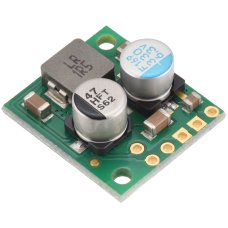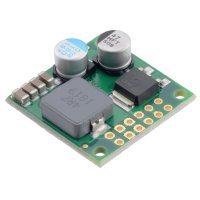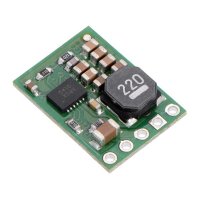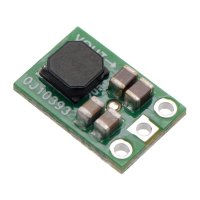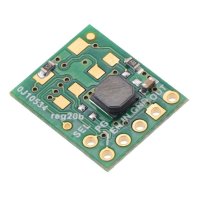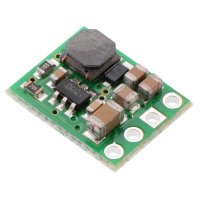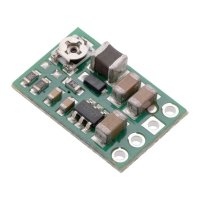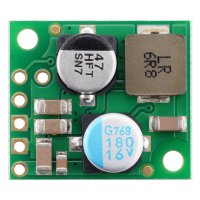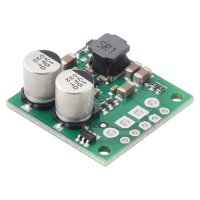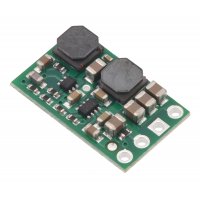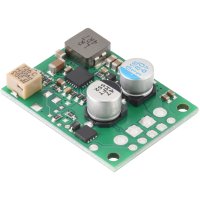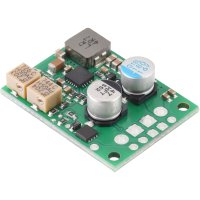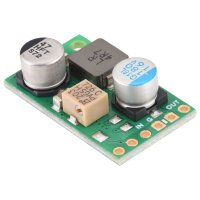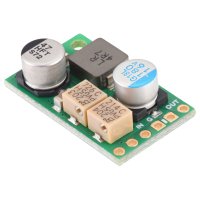The D30V30Fx family of buck (step-down) voltage regulators generates lower output voltages from input voltages as high as 45 V. They are switching regulators (also called switched-mode power supplies (SMPS) or DC-to-DC converters), which makes them much more efficient than linear voltage regulators, especially when the difference between the input and output voltage is large. These regulators can typically support continuous output currents between 2 A and 4 A, depending on the input voltage and output voltage (see the Maximum continuous output current section below). In general, the available output current is a little higher for the lower-voltage versions than it is for the higher-voltage versions, and it decreases as the input voltage increases.

This family includes seven versions with fixed output voltages ranging from 3.3 V to 15 V:
- D30V30F3: Fixed 3.3V output
- D30V30F5: Fixed 5V output
- D30V30F6: Fixed 6V output
- D30V30F7: Fixed 7.5V output
- D30V30F9: Fixed 9V output
- D30V30F12: Fixed 12V output
- D30V30F15: Fixed 15V output
The regulators have reverse voltage protection up to 40 V, input under-voltage lockout, over-current protection, and short-circuit protection. A thermal shutdown feature also helps prevent damage from overheating and a soft-start feature limits the inrush current and gradually ramps the output voltage on startup.
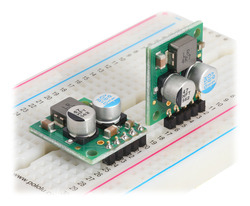
If you need more output current, consider the very similar D36V50Fx family of step-down voltage regulators, and if you need higher input voltages, consider the very similar D36V28Fx family.
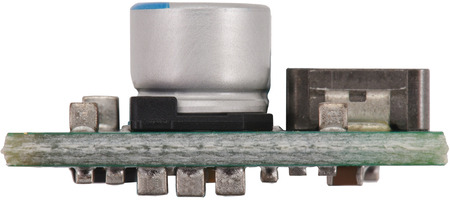
Details for item #4891:
- This small synchronous switching step-down (or buck) regulator takes an input voltage of up to 45 V and efficiently reduces it to 3.3 V. The board measures only 0.7″ × 0.8″ yet delivers typical maximum continuous output currents between 3 A and 4.5 A, depending on the input voltage. An optional enable input can put the regulator in a low-power state with a current draw of 10 µA to 20 µA per volt on VIN. The regulator also features reverse voltage protection and a power-good output that indicates when the regulator cannot adequately maintain the output voltage. The pins have a 0.1″ spacing, making this board compatible with standard solderless breadboards and perfboards.
Details for item #4892:
- This small synchronous switching step-down (or buck) regulator takes an input voltage of up to 45 V and efficiently reduces it to 5 V. The board measures only 0.7″ × 0.8″ yet delivers typical maximum continuous output currents between 3 A and 4 A, depending on the input voltage. An optional enable input can put the regulator in a low-power state with a current draw of 10 µA to 20 µA per volt on VIN. The regulator also features reverse voltage protection and a power-good output that indicates when the regulator cannot adequately maintain the output voltage. The pins have a 0.1″ spacing, making this board compatible with standard solderless breadboards and perfboards.
Details for item #4893:
- This small synchronous switching step-down (or buck) regulator takes an input voltage of up to 45 V and efficiently reduces it to 6 V. The board measures only 0.7″ × 0.8″ yet delivers typical maximum continuous output currents between 2.5 A and 4 A, depending on the input voltage. An optional enable input can put the regulator in a low-power state with a current draw of 10 µA to 20 µA per volt on VIN. The regulator also features reverse voltage protection and a power-good output that indicates when the regulator cannot adequately maintain the output voltage. The pins have a 0.1″ spacing, making this board compatible with standard solderless breadboards and perfboards.
Details for item #4894:
- This small synchronous switching step-down (or buck) regulator takes an input voltage of up to 45 V and efficiently reduces it to 7.5 V. The board measures only 0.7″ × 0.8″ yet delivers typical maximum continuous output currents between 2 A and 3.5 A, depending on the input voltage. An optional enable input can put the regulator in a low-power state with a current draw of 10 µA to 20 µA per volt on VIN. The regulator also features reverse voltage protection and a power-good output that indicates when the regulator cannot adequately maintain the output voltage. The pins have a 0.1″ spacing, making this board compatible with standard solderless breadboards and perfboards.
Details for item #4895:
- This small synchronous switching step-down (or buck) regulator takes an input voltage of up to 45 V and efficiently reduces it to 9 V. The board measures only 0.7″ × 0.8″ yet delivers typical maximum continuous output currents between 2 A and 3.5 A, depending on the input voltage. An optional enable input can put the regulator in a low-power state with a current draw of 10 µA to 20 µA per volt on VIN. The regulator also features reverse voltage protection and a power-good output that indicates when the regulator cannot adequately maintain the output voltage. The pins have a 0.1″ spacing, making this board compatible with standard solderless breadboards and perfboards.
Details for item #4896:
- This small synchronous switching step-down (or buck) regulator takes an input voltage of up to 45 V and efficiently reduces it to 12 V. The board measures only 0.7″ × 0.8″ yet delivers typical maximum continuous output currents between 1.5 A and 3.5 A, depending on the input voltage. An optional enable input can put the regulator in a low-power state with a current draw of 10 µA to 20 µA per volt on VIN. The regulator also features reverse voltage protection and a power-good output that indicates when the regulator cannot adequately maintain the output voltage. The pins have a 0.1″ spacing, making this board compatible with standard solderless breadboards and perfboards.
Details for item #4897:
- This small synchronous switching step-down (or buck) regulator takes an input voltage of up to 45 V and efficiently reduces it to 15 V. The board measures only 0.7″ × 0.8″ yet delivers typical maximum continuous output currents between 1.5 A and 3.2 A, depending on the input voltage. An optional enable input can put the regulator in a low-power state with a current draw of 10 µA to 20 µA per volt on VIN. The regulator also features reverse voltage protection and a power-good output that indicates when the regulator cannot adequately maintain the output voltage. The pins have a 0.1″ spacing, making this board compatible with standard solderless breadboards and perfboards.
Features of 4891/4892/4893/4894/4895/4896/4897:
- Input voltage: 3.3 V/5 V/6 V/7.5 V/9 V/ 12 V/15 V to 45 V (minimum input subject to dropout voltage considerations; see the dropout voltage section for details)
- Output voltage: 3.3 V//5 V/6 V/7.5 V/9 V/ 12 V/15 V with 4% accuracy
- Typical maximum continuous output current: 3 A to 4.5 A /3 A to 4 A/2.5 A to 4 A/2 A to 3.5 A/2 A to 3.5 A/1.5 A to 3.5 A/1.5 A to 3.2 A(see the maximum continuous output current graph below)
- Typical efficiency of 80% to 95%, depending on input voltage, output voltage, and load (see the efficiency graph below)
- Very low dropout voltage
- Switching frequency: ~700 kHz under heavy loads
- Power-save mode that increases light load efficiency by reducing switching frequency
- Low quiescent current (see the quiescent current graph below)
- Enable input with precise cutoff threshold for disconnecting the load and putting the regulator into a low-power state that draws approximately 10 µA to 20 µA per volt on VIN
- “Power good” output indicates when the regulator cannot adequately maintain the output voltage
- Frequency spread spectrum operation that lowers peak EMI noise
- Under-voltage lockout protection
- Soft-start feature limits inrush current and gradually ramps output voltage
- Integrated reverse-voltage protection up to 40 V, over-current and short-circuit protection, over-temperature shutoff
- Compact size: 0.7″ × 0.8″ × 0.355″ (17.8 mm × 20.3 mm × 9 mm); see the dimension diagram (719k pdf) for more information
- Two 0.086″ mounting holes for #2 or M2 screws
Using the Regulator
Connections
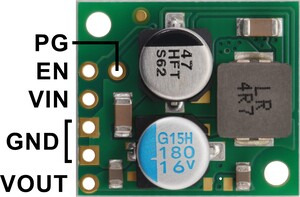
This regulator has six connections: power good (PG), enable (EN), input voltage (VIN), output voltage (VOUT), and two ground (GND) connections.
The “power good” indicator, PG, is an open-drain output that goes low when the regulator’s output voltage either rises more than 7.5% above or falls more than 9% below the nominal voltage (with hysteresis). An external pull-up resistor is required to use this pin.
The regulator, which is enabled by default, can be put into a low-power sleep state by reducing the voltage on the EN pin below 0.85 V, and it can be brought out of this state again by increasing the voltage on EN past 1 V. The shutdown current draw in this sleep mode is dominated by the current in the 100 kΩ pull-up resistor from EN to VIN and in the reverse-voltage protection circuit, which altogether will be between 10 µA and 20 µA per volt on VIN. (Note that for high input voltages the, shutdown current draw when it is disabled is greater than the quiescent draw while enabled; see the quiescent current graph below for more details.) A low-voltage cutoff can be set by adding an appropriately sized external pull-down resistor between EN and GND. This resistor and the on-board 100 kΩ pull-up would together form a VIN voltage divider with the output connected to EN.
The input voltage, VIN, powers the regulator. Voltages between 3.3 V and 45 V can be applied to VIN, but generally the effective lower limit of VIN is VOUT plus the regulator’s dropout voltage, which varies approximately linearly with the load (see below for graphs of the dropout voltage as a function of the load).
VOUT is the regulated output voltage.
Included hardware
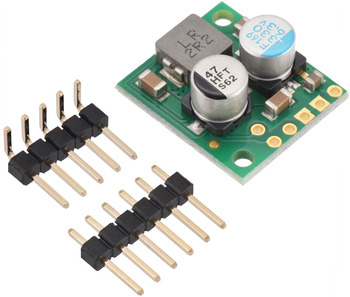
Step-Down Voltage Regulator D30V30Fx, with included hardware.
The six connection through-holes are arranged on a 0.1″ grid for compatibility with solderless breadboards, connectors, and other prototyping arrangements that use a 0.1″ grid. The PG connection is the only one not located along the edge of the board. A 6×1 straight male header strip and a 5×1 right-angle male header strip are included with the regulator; one pin of the straight header can optionally be broken off and soldered into PG.
Typical efficiency
The efficiency of a voltage regulator, defined as (Power out)/(Power in), is an important measure of its performance, especially when battery life or heat are concerns.
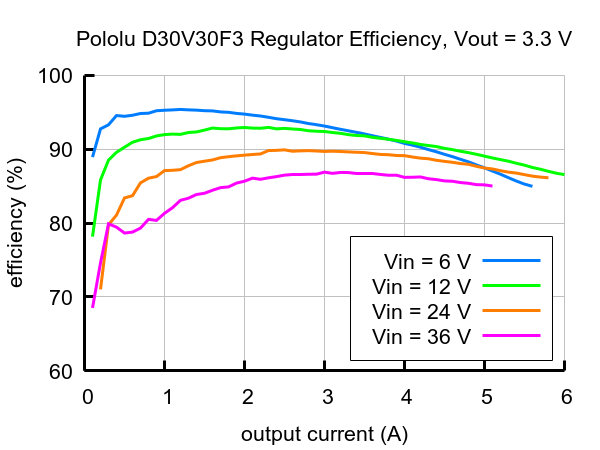
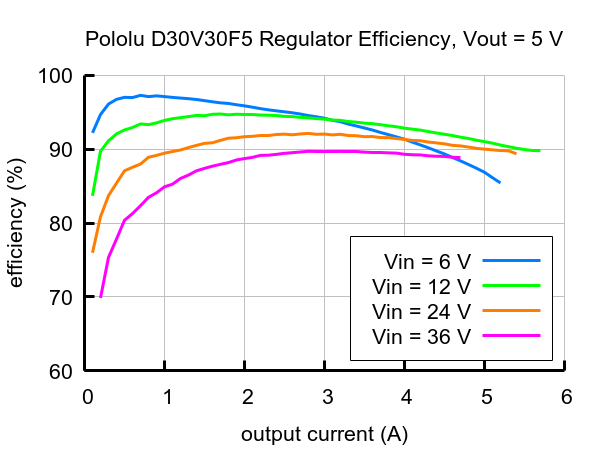
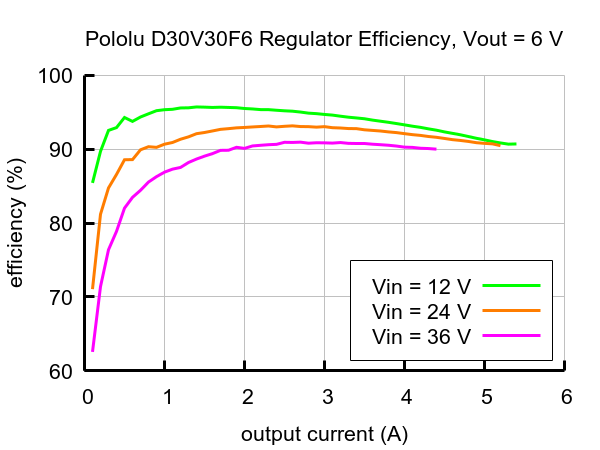
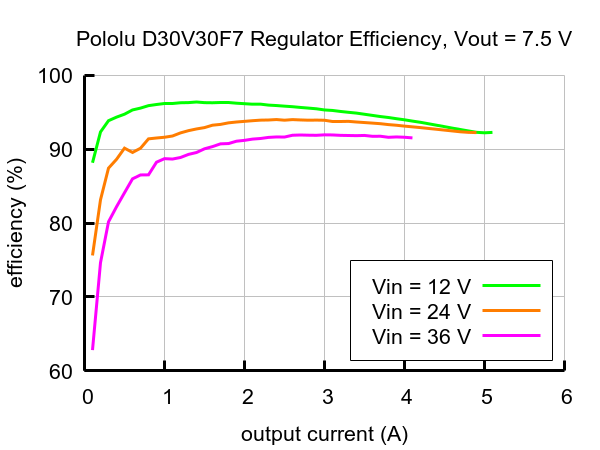
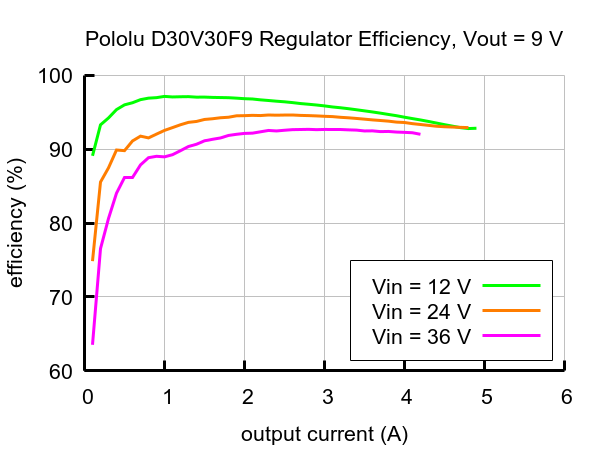
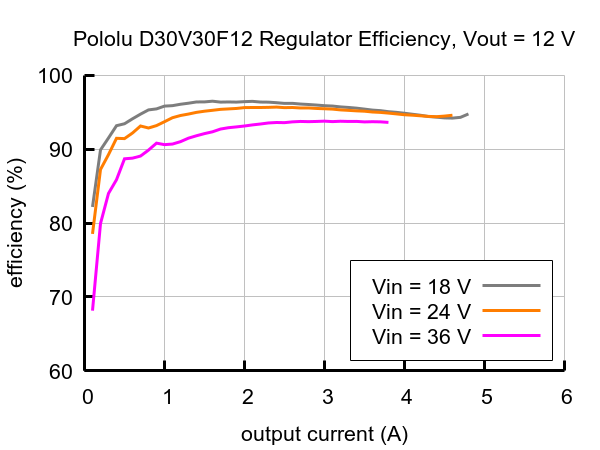
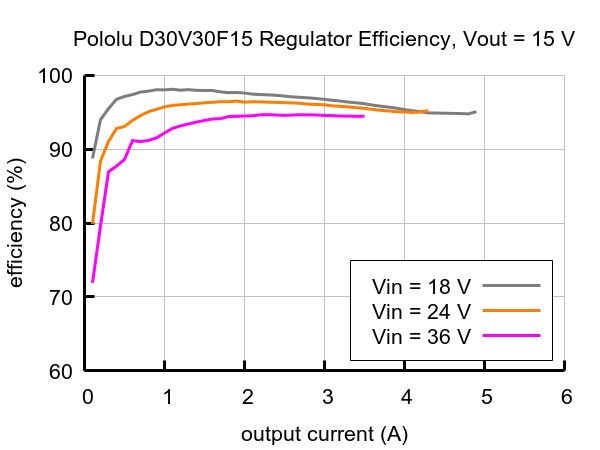
Maximum continuous output current
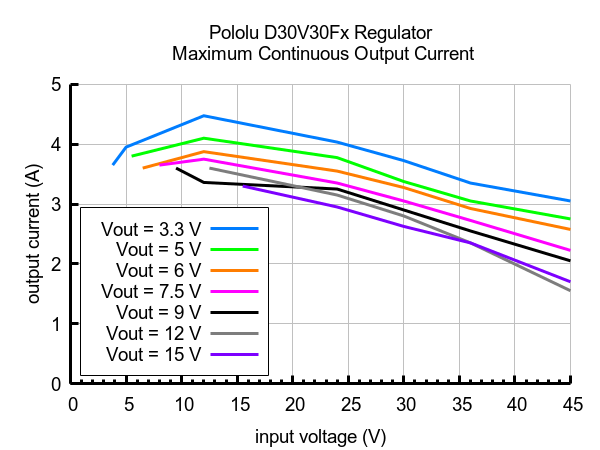
During normal operation, this product can get hot enough to burn you. Take care when handling this product or other components connected to it.
Quiescent current
The quiescent current is the current the regulator uses just to power itself, and the graph below shows this for the different regulator versions as a function of the input voltage. The module’s EN input can be driven low to put the board into a low-power state where it typically draws between 10 µA and 20 µA per volt on VIN.
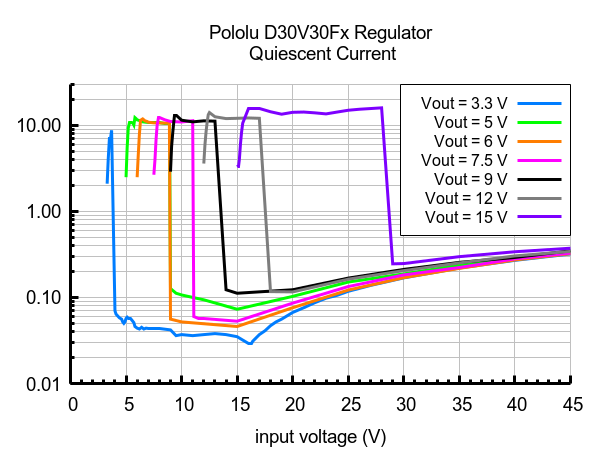
Typical dropout voltage
The dropout voltage of a step-down regulator is the minimum amount by which the input voltage must exceed the regulator’s target output voltage in order to ensure the target output can be achieved. For example, if a 5 V regulator has a 1 V dropout voltage, the input must be at least 6 V to ensure the output is the full 5 V. Generally speaking, the dropout voltage increases as the output current increases. The graph below shows the dropout voltages for the different members of this regulator family:
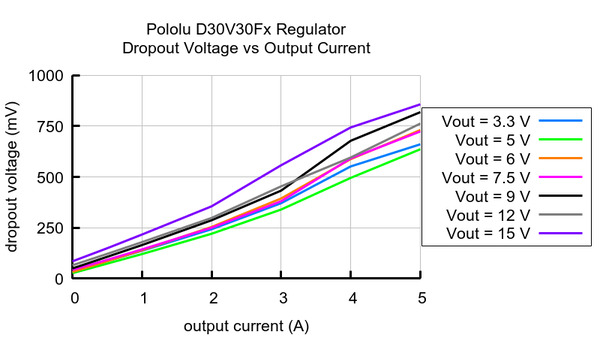
Package Includes:
- 1 x Pololu 4891/4892/4893/4894/4895/4896/4897 3.3V/5V/6V/7.5V/9V/12V/15V Step-Down Voltage Regulator D30V30F3/F5/F6/F7/F9/F12/F15
Pololu 4891/4892/4893/4894/4895/4896/4897 3.3V/5V/6V/7.5V/9V/12V/15V Step-Down Voltage Regulator D30V30F3/F5/F6/F7/F9/F12/F15
- Brand: Pololu
- Product Code: Pololu-Step-Down-Voltage-Regulator
- Reward Points: 11
- Availability: In Stock
- रo 1,101.00
-
रo 969.00
- Price in reward points: 1101
-
- 13 or more रo 1,093.00
- 26 or more रo 1,084.00
- 65 or more रo 1,075.00
- 129 or more रo 1,066.00
Available Options
Related Products
Pololu 4090/4091/4092/4093/4094/4095 Step-Down Voltage Regulator D36V50Fx
The D36V50Fx family of buck (step-down) voltage regulators generates lower output voltages from inpu..
रo 1,892.00 रo 1,971.00
Pololu 2830 / 2831 / 2832 / 2833 / 2834 1A Step-Down Voltage Regulator D24V10F3/ 5/ 6/ 9/ 12
The compact (0.5″ × 0.7″) D24V10F3/ 5/ 6/ 9/ 12 synchronous buck voltage regulator takes an input vo..
रo 754.00 रo 786.00
Pololu 2836 5V Step-Up/Step-Down Voltage Regulator S9V11F5
The S9V11F5 switching step-up/step-down regulator efficiently produces 5 V from input voltages betwe..
रo 679.00 रo 707.00
Pololu 2873 / 2872 / 2871 / 2870 / 2836 / 2868 / 2869 5V/3.3V/2.5V Step-Up/Step-Down Voltage Regulator w/ Fixed 3V Low-Voltage Cutoff S9V11F5S6CMA/ F5/ F3S5C3/ F3S5/ F3S5CMA/ 5S6CMA/ MACMA
The S9V11x family of efficient switching regulators (also called switched-mode power supplies (SMPS)..
रo 602.00 रo 628.00
Pololu 3791/3792/3793/3794/3795/3796/3797 600mA Step-Down Voltage Regulator D36V6 F3/ F5/ F6 /F7/ F9/ F12/ F15
This compact (0.4″ × 0.5″) switching step-down (or buck) voltage regulator takes input voltages betw..
रo 376.00 रo 391.00
Pololu 3798/3799 600mA Step-Down Voltage Regulator D36V6 ALV/ AHV
This compact (0.4″ × 0.5″) switching step-down (or buck) voltage regulator takes input voltages betw..
रo 527.00 रo 549.00
Pololu 3784/3786 Step-Down Voltage Regulator D36V28F7/12
This small synchronous switching step-down (or buck) regulator takes an input voltage of up to 50 V ..
रo 1,286.00 रo 1,339.00
Pololu 4980/4981/4982/4983/4984/4985 3.3V/6V/7.5V/9V/12V/15V 2.5A Step-Up/Step-Down Voltage Regulator S13V25F3/F6/F7/F9/F12/F15
This synchronous switching step-up/step-down regulator efficiently produces 3.3 V / 6 V / 7.5 ..
रo 1,057.00 रo 1,101.00
Pololu 4964/4965/4966/4967/4968 3.3V/5V/6V/7.5V/9V Step-Up/Step-Down Voltage Regulator S8V9F3/F5/F6/F7/F9
This synchronous switching step-up/step-down regulator efficiently produces 3.3 V/ 5 V/6 V/ 7.5 V/ 3..
रo 702.00 रo 731.00
Pololu 4855 4.2-15V, 3.3A Fine-Adjust Step-Down Voltage Regulator D30V33MAS
The D30V3x line of synchronous buck (step-down) voltage regulators generates lower output voltages f..
रo 1,361.00 रo 1,417.00
Pololu 4854 4.2-15V, 3.3A Fine-Adjust Step-Down Voltage Regulator w/ Adjustable Low-Voltage Cutoff D30V33MASCMA
The D30V3x line of synchronous buck (step-down) voltage regulators generates lower output voltages f..
रo 2,044.00 रo 2,129.00
Pololu 4875 4.2-15V, 3A Fine-Adjust Step-Down Voltage Regulator D30V30MAS
The D30V3x line of synchronous buck (step-down) voltage regulators generates lower output voltages f..
रo 1,664.00 रo 1,733.00
Pololu 4874 4.2-15V, 3A Fine-Adjust Step-Down Voltage Regulator w/ Adjustable Low-Voltage Cutoff D30V30MASCMA
The D30V3x line of synchronous buck (step-down) voltage regulators generates lower output voltages f..
रo 1,967.00 रo 2,049.00

